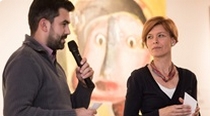Companies at the Anti-Corruption Forum discuss how to make Slovakia a better place to live in
Connection and collaboration were the topics of the Anti-Corruption Forum, which is a yearly event organized by The Fund for a Transparent Slovakia.

Representatives of non-profit companies, businesses, public administration, and the media shared their experiences with various forms of partnership for the sake of accomplishing common goals.
When cooperation is mutually beneficial
Via Iuris is an association which persistently focuses on reforming the judiciary, the prosecutor’s office, and the police. It attempts to bring systemic solutions and the enforcement of the law so that it is applicable to everybody to an equal extent. “In order to implement this task, we need social and financial support. Collaboration with business is a big motivation for us in terms of content and it allows us to gain another perspective and welcome assistance on specific questions, such as financial sustainability,” said Zuzana Čaputová, a lawyer working with Via Iuris. An example of such collaboration with the association is the Amicus Club, where some companies feature as affiliate members of Via Iuris, or the inclusion of some companies’ representatives on the board of directors.
Common goals bring us together
Mutually beneficial synergies are created between non-profit organizations and businesses as well as between non-profit organizations themselves. The Fair-Play Alliance is trying to connect initiatives which are not indifferent to the fact that in Slovakia people are confronted with a malfunctioning state. One example is the successful collaboration with Slovensko.Digital.
“At the beginning of our existence, we published a challenge about how we imagined the key-phrase ‘better national IT’,” said Ján Hargaš, the executive director of the Slovensko.Digital initiative. “We are IT guys who understand when something malfunctions from the technical point of view. However, we are not quite able to enforce a political change. The Fair-Play Alliance helps us formulate and communicate matters in such way so that they are understood by the wider public.” In the last year, the two organizations have managed to stop unfavourable tenders to a total amount of €250 million.




































Anything the state does should be done with the utmost efficiency
In many fields, Slovakia does not achieve the results it could. Examples of this include education and the often mentioned informatization. Štefan Kišš from the Value for Money Division (VMD) of the Ministry of Finance of the Slovak Republic came to talk about what can be done with this situation. His goal is to increase the value which the public gets for their money and to assess if taxpayers’ money is truly going to be used in the best possible manner. “It takes time and the change is more likely to come with an evolution rather than a revolution,” thinks Kišš. In spite of this, the VMD has brought its first results within the first half-year of its existence. It elaborated an analysis of possible savings in the health, informatization, and transport sectors. “It will be necessary to ‘deliver’ the identified savings, i.e., to move from charts to the real presence of savings which we will feel”, said Kišš in summing up the challenge in future months.
Let’s learn from positive examples from abroad
Zuzana Petková from the Trend weekly newsmagazine and Marek Vagovič from the Aktuality.sk website also accepted an invitation to the discussion. They both have long been dedicated to studying corruption, and they have both worked on cases of positive change in other countries. What is needed to return a kidnapped state back to the hands of its citizens? “Replace three to four people in key positions who will have the support of the public. Once they manage to achieve the first results, they will gain more confidence and the situation may actually begin to change,” suggests Petková.
There are plenty of examples around us. In Romania, a special independent National Anti-Corruption Directorate, led by prosecutor Laura Kövesi, has been recently created in fulfilment of a request made by the European Union during pre-accession negotiations. The office has already managed to impose criminal responsibility on influential politicians, including two prime ministers and a number of cabinet ministers. There has been a similar achievement in the Czech Republic, where a group of prosecutors led by Lenka Bradáčová have started systematic changes that have come from within the prosecutor’s office.
At the Pontis Foundation we believe that if we want to live in a more reputable country, everything relies on the ability to connect the largest number of supporters possible. The frustration that has been present in Slovakia for a longer time already is an enormous challenge for our country, and all those who want to change things need to be connected. Together, we are more powerful than when systemic and legislative changes are implemented individually. This is also the reason why twenty-three companies have already become members of the Fund for a Transparent Slovakia, and they will help us to make Slovakia a better place to live in. Let’s hope that more companies will join them.






